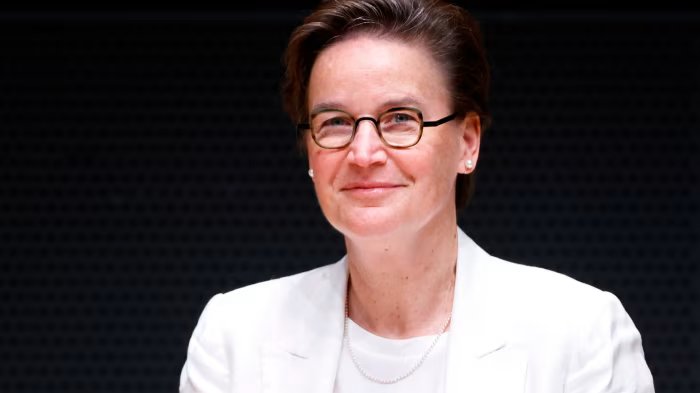Unlock the Editor’s Digest for free
Roula Khalaf, Editor of the FT, selects her favourite stories in this weekly newsletter.
Stock exchanges, cryptocurrency companies and clearing houses operating in the EU are set to come under the supervision of the bloc’s markets watchdog, according to its chair.
Verena Ross, chair of the European Securities and Markets Authority, told the Financial Times that under plans being drawn up by the European Commission, the regulation of several areas of EU financial markets is likely to be transferred from national authorities to Esma.
Such changes would provide a key impetus towards “having a capital market in Europe that is more integrated and globally competitive”, she said.
The plans, which are controversial among smaller EU countries such as Luxembourg and Malta, are designed to “ensure that we are addressing the continued fragmentation in markets and resolve that to create more of a single market for capital in Europe”, Ross added.
The EU initially proposed making Esma the main supervisor of crypto asset service providers — such as exchanges and custodians of digital currencies — when drawing up its landmark Markets in Crypto-Assets (MiCA) regulation, which came into force this year.
But criticism of Esma’s ability to handle this meant oversight of the fast-growing crypto market was left in the hands of national authorities — a decision Ross said had created inefficiencies.
In July, Esma criticised Malta’s process for approving pan-EU licences for crypto companies, saying “some risks areas were not adequately assessed during the authorisation process” for one unnamed company.
“While we are doing a lot of work to try to make sure the implementation of MiCA is aligned, it clearly takes a lot of effort from us and the national supervisors to achieve that,” Ross said.
“It also means that people had to build up specific new resources and expertise 27 times in different national supervisors, which could have been done more efficiently once at a European level.”
Esma was established in 2011 to improve the harmonisation of rules across the EU. But many of the bloc’s financial market activities continue to be supervised by its 27 national authorities.
“We have tried for quite some time with the capital markets union and other initiatives to build a more effective capital market,” said Ross. “The reality has been that it is not easy to do given we have very different market structures.”
Mario Draghi, the former European Central Bank president, in a landmark report last year identified the transformation of Esma into a single common regulator for all of the bloc’s securities markets — similar to the Securities and Exchange Commission in the US — as “a key pillar” in boosting Europe’s capital markets.
Some smaller EU countries, such as Luxembourg, Malta and Ireland, have opposed centralising powers at Esma, fearing it could undermine their thriving financial sectors.
Claude Marx, head of Luxembourg’s financial watchdog, said recently that if Esma was made the main supervisor for all EU investment funds, this would create a “monster”.
However, the Esma chair said that the bloc’s need to find funding for its vast investment in defence, green energy and digitisation had given fresh impetus to the push for “breaking down the barriers and fragmentation that still exist”.
She added: “The demand for that is so high now given the need for finding private capital sources to support Europe’s strategic priorities, it has clearly gone up a level, not just at the EU level but also at member states.”
The Paris-based authority has already been given extra powers since the publication of Draghi’s report.
From next year, it will take over the supervision of new providers of consolidated tapes — a database of live stock information — for equity and bond prices, and also of agencies providing environmental, social and governance ratings.
Maria Luís Albuquerque, EU commissioner for financial services, said in a speech last month that it was “considering a proposal to transfer supervisory powers to Esma for the most significant cross-border entities” including stock exchanges, crypto companies and central counterparties.
“All of this would imply changes to the governance and decision-making processes of Esma, and we have various models to consider based on other existing models of centralised supervision,” said Albuquerque.
Additional reporting by Paola Tamma in Brussels


